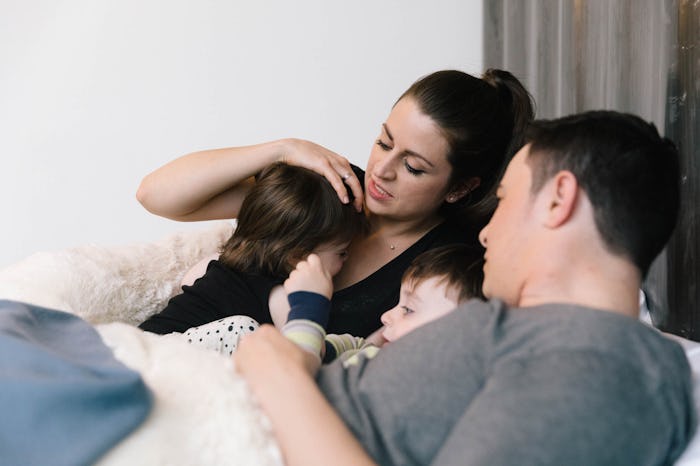Life
Experts Weigh In On Co-Sleeping & The Not-So-Great Habits It Can Create For Your Kids
I don't think there are many parents out there who haven't had a toddler or two in their beds at some point. Let's be honest, there are times when it's just easier to let them crawl in bed with you than it is to let them cry it out or get up to ask for water every 11 minutes. Mama just needs a rest — or at least as much rest as one can achieve while in bed with a child. But does co-sleeping create bad habits? Because the silent bliss that follows the struggle feels almost worth it to me.
Co-sleeping, whether it's done under duress or by design, is a fairly common occurrence, noted the American Academy of Pediatrics (AAP). Proponents for the practice have said that it enhances the bond between parent and child, that it's just a part of our humanity, and that it improves a baby's sleep and overall restfulness. However, recent research disputed the idea that it is beneficial for a good night's sleep. A study published in Sleep Medicine examined bed-sharing children and their parents over a long period of time and found that families who practice this form of co-sleeping were less rested, and more alert during the night. The babies and mothers were found to be more prone to waking or light sleeping.
I have really struggled with this. It wasn't so much a problem when my kids were infants, but as they got older. My daughter would scream for my husband in the middle of the night before running into our room and cozying up between us. At zero dark thirty, we just didn't have the desire or the energy to kick our toddler out of our bed. We would always say "just this once," and tell her in the morning that she absolutely must stay in her own bed the next night.
You can see where this is going. Reader, she did not stay in her bed that night, or the night after. In fact, it wasn't until she started crawling in her brother's queen sized bed instead of ours that she stopped pulling the middle of the night freak-out. Thankfully, at 7, she's grown out of this habit, and into the fun new habit of chatting up her brother all night while he's trying to read his book past his bedtime without my noticing. I now wonder, does co-sleeping create bad habits that last well into childhood, or should I be looking in a different direction as to why my daughter's sleep patterns are the way they are?
According to research and sleep experts, the biggest concern is that once your baby or child starts sleeping with you, they're never going to want to sleep alone. Sleep expert Valerie Levine, PhD wrote in her book Breaking the Co-Sleeping Habit that "one downside to the family bed is that the child may never be willing to leave." She did note that some children are completely capable of an easy transition and learn to love the independence of sleeping alone, but that in many cases, "the transition from the family bed to independent sleep is difficult for children — and it can be extremely difficult for you to convince your child to make the change."
Sleep researcher Mari Hysing of the Norwegian Institute of Public Health found that "sharing a bed with the child showed a clear connection with the development of sleep difficulties over time, even after taking into account previous sleep disorders. The definition of co-sleeping was a child who slept more than half the night with his parents." Further research of hers indicated that this has long-term implications, as her research noted that it's possible that sleep patterns that affect children and adolescents begin in the early years of life, setting children up for long-term problems with sleep and sleep hygiene.
However, Dr. Sears disagrees and wrote on his website that co-sleeping, while considered dangerous by the AAP, leads to healthier, happier, children with stronger parent-child bonds. In the end, it's going to be an individual choice that you honestly might be making out of desperation, as so many of us do. If you're worried about your child's sleep, don't do what I did and bury your head in the duvet. Talk to your pediatrician and make a game plan. Everyone will be happier for it.
